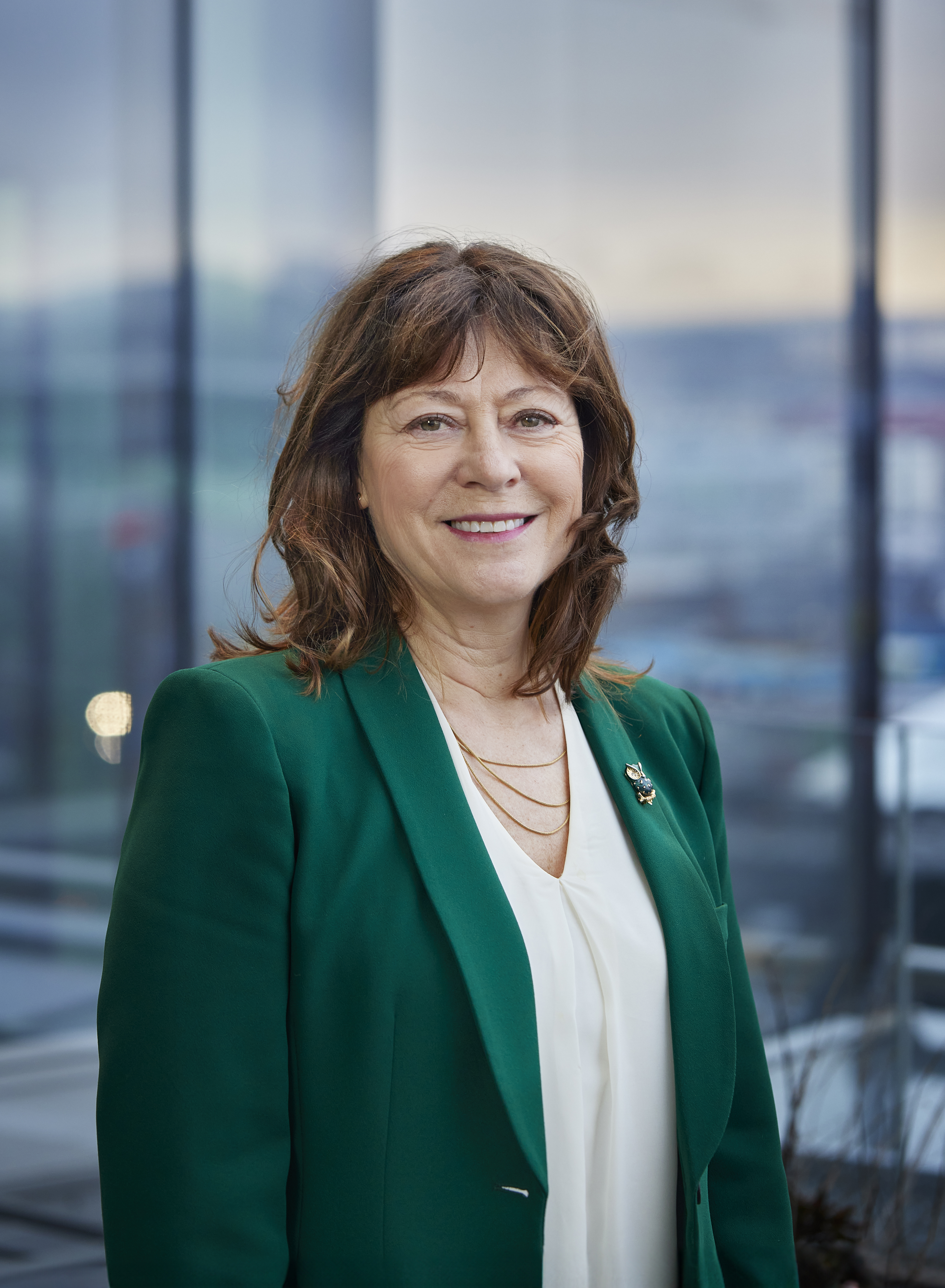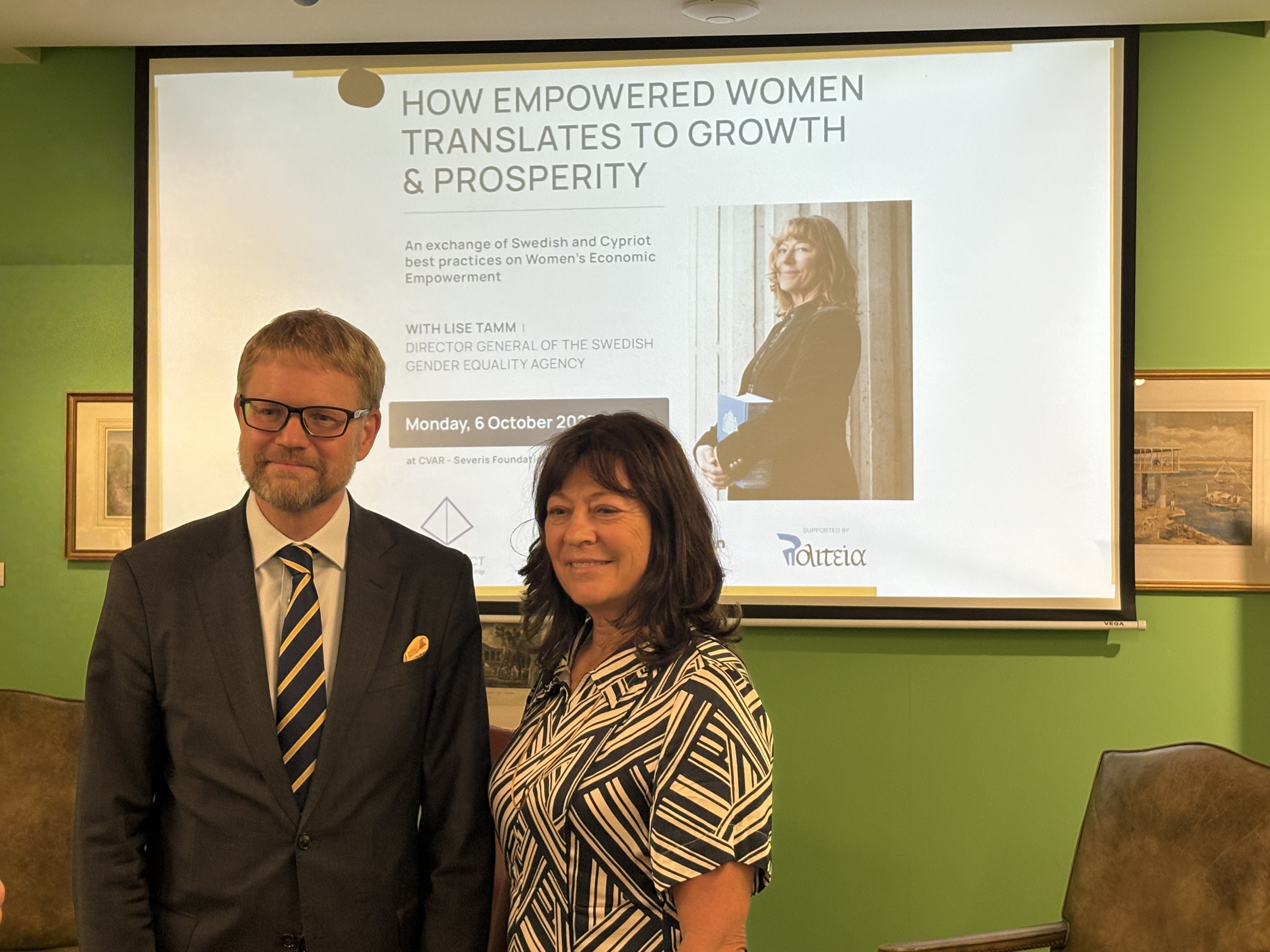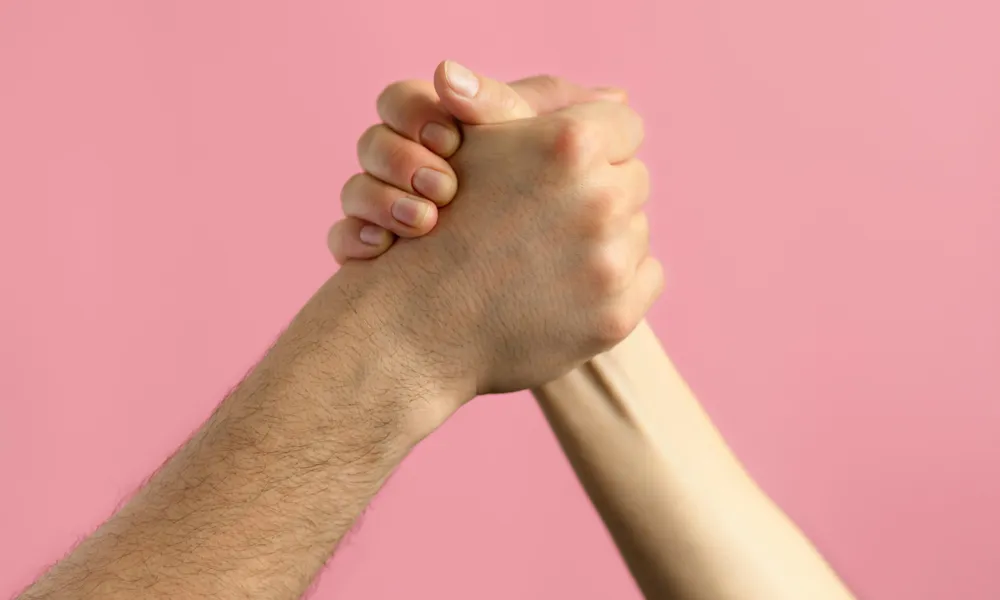As Cyprus heads into parliamentary elections in just eight months, and with the island ranked lowest in the EU for women’s representation, Politis to the Point continues its series of testimonies and interviews giving women the floor, pressing political parties to move beyond promises and token gestures toward genuine structural change and equality.
Politis to the point spoke to Lise Tamm, Director General of the Swedish Gender Equality Agency, during her visit to Cyprus for the “Women’s Economic Empowerment” event organised by Women Act-Cyprus and the Embassy of Sweden in Nicosia.

Sweden looms large in Cyprus as a kind of social North Star. But even there, the work is unfinished. In Nicosia, Lise Tamm - Director General of the Swedish Gender Equality Agency, former chief public prosecutor at Sweden’s National Unit Against Organised Crime, and a 2022-23 trial lawyer at the International Criminal Court - recently named SWEA’s “Swedish Woman of the Year” 2024 - spoke plainly about what moves the needle: welfare design that frees women to work, laws that reset norms, and conversations with boys and men that start early and never stop.
“We are one of the best countries for gender equality,” she began, “and life is better for everyone thanks to it.” She refers to the “gold” standard - what the Swedes metaphorically use to describe the Nordic countries’ strong record on their level on values such as trust, gender equality, social welfare, and democracy. Gender equality is built into Sweden’s constitution, its institutions and, crucially, its everyday choices. That didn’t arrive by accident. As Tamm recalls, women’s movements and NGOs pushed for decades while parties from left to right, together with trade unions, sat at the same table and kept pushing reforms through. Universal, affordable childcare and elder care made it realistic for women to work; individual taxation and parental leave with non-transferable months forced a cultural shift at home: “If you don’t work, you don’t have your own income; you’ll never have gender equality. Economic independence is vital.”
Law that changes culture
Law has been the other lever. From a prosecutor’s vantage point, Tamm has watched statutes change culture. Sweden’s “demand” approach to prostitution -criminalising the buyers of sex, not the person in prostitution- “was a game-changer because it cuts demand”. Consent-based rape law, she added, made the standard unambiguous: “If both don’t consent, it’s rape.” Her point is not abstract. She has handled trafficking cases that “you never forget” and is relentless about the lesson they teach; crime prevention and violence prevention must go together, because violence breeds crime.
Inside the agency she now leads, the mandate is to make women and men equally able to shape society and their own lives - across economic equality, education, healthcare, the division of unpaid work, power and influence, and ending men’s violence against women. It coordinates policy analysis and follow-up, supports gender mainstreaming across the public sector, and funds organisations working on violence prevention and women’s mobilisation.
Networks and role models
For all the progress, the gaps remain familiar. The parliament is used to “zipper” lists that alternate men and women; municipal politics still schedules meetings at hours parents can’t realistically manage. However, in the private sector, women are too often found in Human Resource positions while big multinationals stay male at the top. And the labour market is sharply segregated: women cluster in health and education; men dominate STEM and the trades. “It’s not feminine to be a nurse; it’s human,” she says. The fix won’t be a single quota but a mesh of incentives, networks and role models, plus protective laws where they matter most.
Tamm argues that change accelerates when people can see it and join it. She wants visible role models to step up; men who take leave, cook, and share care, so boys learn early that empathy and responsibility are human, not “feminine”. Networks then keep minorities from being isolated: “women carpenters unite”, she says, and in female-dominated “HEED” sectors, men need their own support groups too. With unions and workplaces backing these networks, women stay and advance in STEM and trades, men stay in care, and the norm quietly shifts toward real equality.

with Director General of the Swedish Gender Equality Agency Lise Tamm
Tackling domestic violence
The hardest edge of the job, and the place where systems still fail, is violence. Sweden records 12-15 femicides a year by partners or former partners, a stubbornly flat number. Too many of those killings were predictable: the woman had asked for help; the risk peaked when she tried to leave; the children had lived with the violence and weren’t treated as victims in their own right. Several professional degree programs already include mandatory education on men's violence against women, including physiotherapists, lawyers, medical doctors, nurses, psychologists, dentists, and social workers. She has seen how judicial culture can move. After her agency analysed custody decisions that continued to hand violent fathers access, they began providing online training for judges ; only then did practice start to shift.
“Make the good guys step up”
The conversation comes back to boys and men. “We have to start in preschool,” she says, where empathy is taught to boys as human, not “feminine”, and where teachers stop telling little boys to swallow their tears. If men understand what’s in it for them -closer relationships with their children, better mental health, richer social lives- equality stops sounding like a loss. “Make the good guys step up,” she says. Show boys what that looks like, and back it with design choices that force the issue: non-transferable parental-leave months, childcare you can actually afford, responsibilities that don’t punish caregiving.
Cyprus, she insists, can move faster than is commonly believed. During her visit on the island she met focal points and the Council of the National Machinery for Women’s Rights, and the translation from Swedish practice to Cypriot reality is surprisingly direct. Workplaces can become part of the safety net by treating domestic violence the way they treat health and safety, training managers how to ask, respond and refer, and making it routine to talk about what’s “usually unsaid.” Courts, police and social services can be trained to see the risk that is already there, especially at separation. Universities can normalise GBV (Gender-Based Violence) education across disciplines. And the story the country talks about masculinity can change; on billboards, in classrooms, in prime-time panels that still book only one woman among many men to talk about politics, AI or growth.
The fight for real democracy
She is clear-eyed about headwinds; polarised geopolitics, social media ecosystems that funnel boys to porn and violence as early as 11, an economy that still rewards capital income unequally and draws more men into finance. But the democratic case for equality, to her, is non-negotiable: “If you don’t have gender equality, you don’t have a real democracy.” The work is incremental and sometimes exhausting. It is also cumulative. Sweden’s gains were built over decades by institutions designed to stick to the plan. That’s why the Swedish Gender Equality Agency exists at all.
In Nicosia, amid a programme devoted to women’s economic empowerment and growth, Tamm distilled it to something simple: start early; legislate where it counts; make violence talkable; change how we work so fathers must care; and never accept impunity.
Equality is not a favour to women. It’s how a country uses all its talent, and how a democracy keeps its promise.
